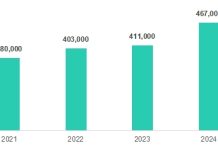PT Bank OCBC NISP Tbk (OCBC), in partnership with NielsenIQ (NIQ) Indonesia, has unveiled the second OCBC Business Fitness Index (BFI), a study aimed at assessing the financial behavior of MSMEs in Indonesia.
The findings reveal that Indonesian MSMEs have made significant strides in financial management, with a score of 60, reflecting better financial recording, profit and loss reviews, and capital maintenance.
However, only 46% of MSMEs have fully separated their personal and business finances, posing potential risks to cash flow and long-term sustainability.
The research highlights that MSMEs registered as business entities show a better understanding of financial systems and risk planning, scoring 60.2 compared to 47.4 for non-registered entities. This improvement is attributed to clearer business strategies, more structured financial records, and stronger business continuity benchmarks.
The Indonesian government has simplified the process for MSMEs to establish business entities through the Single Shareholder Limited Company (PT Perorangan) regulation under the Job Creation Law No. 11 of 2020, making it easier for MSMEs to scale.
According to Inggit Primadevi, Director of Consumer Insights at NIQ Indonesia, “80% of MSMEs remain unregistered as business entities, and only 3% have adopted the PT Perorangan structure, indicating a need for more MSMEs to formalise their businesses.”
Sari Kartika, SME Proposition Division Head at OCBC, emphasized the importance of separating business and personal finances and unveiled OCBC’s innovative digital solution, which allows MSMEs to open a business checking account entirely online within hours.
This initiative simplifies the process for entrepreneurs, especially registered business entities, to manage their finances more effectively.
The research also showed that 77% of MSMEs engage in financial record-keeping, though most still do so manually. The overall financial health score of MSMEs has risen to 48, up from 43.8 last year, but remains below the ideal score of 75, signaling room for further improvement.
On the digital front, while 81% of MSMEs have social media accounts, only 35% utilize them effectively, and just 17% use e-commerce platforms, revealing the need for greater digital engagement to expand their market reach.
As part of its commitment to fostering a more inclusive economy, OCBC continues to support MSMEs, particularly female entrepreneurs and individuals with disabilities. Initiatives like the TAYTB Women Warrior Berani Cuantik program and the OCBC Preneurship ‘UMKM Disabilitas Melaju Jauh’ CSR program provide business coaching, financial training, and empowerment to underrepresented groups.
The OCBC Business Fitness Index was developed through a survey of 620 MSME owners, directors, and financial managers across Jakarta, Medan, Bandung, and Surabaya. The research focuses on three core pillars: financial management, business planning, and capital, alongside entrepreneurial behavior and agility.















